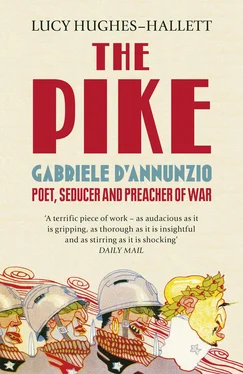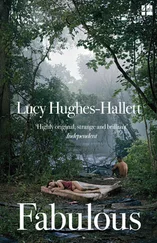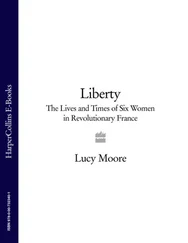He had not, as a young man, shown much enthusiasm for the soldier’s life. He had been a resourceful evader of national service and, when he found himself unable to defer the evil day any longer, he served his country with extreme ill grace. ‘It is certain death for me,’ he wrote to his lover. ‘Ariel a corporal!’ (Like Shelley, one of the models for his own persona, he named himself after Shakespeare’s androgynous spirit.) ‘The delicate Ariel! Can you imagine it?’ He was obliged to live in barracks and groom his own horse. He left the army with relief. Now, a quarter of a century later, he was avid to rejoin it.
As he waited in Rome for instructions as to where he was to present himself he fretted over the difficulty of getting his uniforms made. Luigi Albertini, who was expecting a Song of War from him for publication in the Corriere della Sera, received instead a letter complaining about the difficulty of finding a tailor. Soon, though, he was wearing the elegant white outfit of the Novara Lancers, and experiencing curiously mixed feelings about it. ‘I already feel I belong to a caste, and that I am the prisoner of rules.’ He was to be attached to the staff of the Duke of Aosta – the King’s taller, more charismatic cousin who commanded the Third Army – and given almost unlimited licence to define his own war work. He had permission from the commander-in-chief, General Cadorna, to visit any part of the front and to participate in any manoeuvres he chose. He was to be, not a leader, but an inspirer.
His progress northward at the end of July was attended by almost as much excitement as his arrival in Italy had been. Minister Martini, who saw the pushy adolescent he remembered all too clearly in the world famous poet, wrote irritably that d’Annunzio would have done better to have gone directly and ‘in silence’ to the military base at Udine, ‘but he can’t live without réclame’. He went to Pescara to pay a farewell visit to his mother, who was by this time paralysed and mute, and was lavishly fêted by his fellow Abruzzese. He stopped off in Ferrara and presented the manuscript of his play ‘Parisina’ to the mayor in a public ceremony, declaring that he ‘carried the beauty of that city in [his] intrepid heart’. Martini wrote that this was ‘all foolishness which annoys the public’, but he was wrong: the public responded warmly.
As usual, d’Annunzio was spending money like there was no tomorrow – a natural response to the onset of a war perhaps, but one which was exasperating to Albertini, who was acting as his unofficial manager and saw all too clearly how close d’Annunzio was coming to another financial catastrophe. He was unable to settle his bill at the expensive Hotel Regina where he had stayed for two months; nearly three years later he was still trying to retrieve the trunks full of clothes and knick-knacks he was obliged to leave there in lieu of payment. He had to beg his book publisher, Treves, for an advance to pay for the two horses which, as a cavalry officer, he was expected to provide. Now Albertini urged him to go straight to the Duke of Aosta’s headquarters: good sensible advice. ‘There you’ll eat regular meals for four lire a day. Perhaps you won’t need to pay for lodging. They’ll give you 400 lire a month. See what horizons open up!’ Not the kind of horizons that drew d’Annunzio. On arrival in Venice he checked into the Hotel Danieli, then, as now, one of the grandest hotels on earth.
For Italians the Great War was fought along the border with Austria, in the mountains to the north and east of Venice. The city was drastically changed. The summer of 1914 had been, according to the contemporary Venetian historian Gino Damerini, an especially brilliant season. American, English, French, German, Hungarian, and Russian visitors packed out the hotels, restaurants and beaches, ‘each competing with the others in luxury, nudist exhibitionism, hedonist wildness, carnivalesque fancies and pretentious elegance’. The palaces along the Grand Canal, many of whose proprietors were d’Annunzio’s old acquaintances, were all open, flooding the hot, still nights with light and music. Then came the assassination at Sarajevo, and ‘at the echo of the first cannon shot all those people … the illuminations, the silk, the jewels, the kaleidoscopic game of devil-may-care sophistication … vanished, as though sucked away by a whirlwind’. By the time d’Annunzio arrived a year later, Venice had assumed the character of a military and naval base, and a city under imminent danger of attack. The larger canals were blocked. The altane, the rickety wooden roof terraces with which the land-starved Venetians have been consoling themselves for their lack of gardens since at least the fifteenth century, had been taken over by air-raid wardens: on the high platforms where Carpaccio painted courtesans bleaching their hair in the sun, there were now searchlights and sirens. Statues were hidden by mounds of sandbags. The palaces and churches stood stripped, their treasures removed and hidden. Hotels were hospitals. The entrance halls of grand houses sheltered refugees. At the brightest of times Venice is a place in which one easily loses oneself. Blacked out, it became a labyrinth through which its inhabitants fumbled at night as though blind.
En route north, d’Annunzio wrote in his notebook: ‘Sense of emptiness and distance. Life and the reasons for living elude me. Between two streams, between past and future … Tedium. Lukewarm water … Necessity for action.’ On arriving in Venice, finding action was, accordingly, d’Annunzio’s first priority. Within two days, he was on board the leading destroyer of a naval squadron on night manoeuvres, travelling east along the coast towards Austrian-held Trieste in the hope of encountering enemy vessels.
He made notes about the moonlight, the crisscrossing lines of the ships’ wakes, the sailors eating as they sat silent around their guns, all of which later found its way into his wartime writings. He was to be a witness: he was also to be an ‘inspiration’. Two weeks before his arrival the Italian cruiser Amalfi had been torpedoed and sunk. Scores of Italian seamen died. D’Annunzio addressed the survivors, who were being sent back into action. ‘Now is not the time for words,’ he said, for the first of many, many times; but words were what he brought them. Throughout the remainder of the war he was to speak again and again, to men going into battle, to men returning exhausted, to men burying their dead. He spoke of blood and sacrifice, of memory and patriotism, and the duty owed by the living to those who had died for Italy. His funeral orations posthumously awarded the wretched conscripts the dignity of heroes; his pre-battle harangues presented the bloody slog of modern warfare as noble sacrifice. His gift for oratory had become an instrument of war.
To urge others on, though, was not enough to satisfy him. He sought a role appropriate to a superman. He found it in the air. D’Annunzio had always been fascinated by flight. For decades he worked and reworked the myth of Icarus in his poetry. We have already seen him making his first flight at the 1909 Brescia air show. When he moved to France he frequented the airfield at Villacoublay, and several times he flew again. Shortly after arriving in Venice in July 1915, he made his way to the island airbase at Forte Sant’Andrea, at the mouth of the lagoon. There he met the young pilot, Giuseppe Miraglia.
Well connected (his father was director general of the Banco di Napoli and a political insider) and, according to d’Annunzio, bronze-skinned, with greenish-yellowish eyes flecked with gold, Miraglia was a paragon to his fellow servicemen, known for having gone alone into enemy-occupied Pola with only a pistol for defence. He was to be the first of a series of young men who became for d’Annunzio, during the war years, at once beloved comrades and incarnations of his ideals of youthful valour and fit sacrifice. ‘Blessed are those who are now twenty years old,’ he said. He worshipped and envied their beauty and took enormous pleasure in the opportunities the war afforded him to live alongside them as companions-in-arms. Their deaths were marvellous to him. When they were killed, as one after another they were, he took them into the pantheon he was elaborating in his writing and speeches, making them the martyrs and cult heroes of his new mythology of war.
Читать дальше












